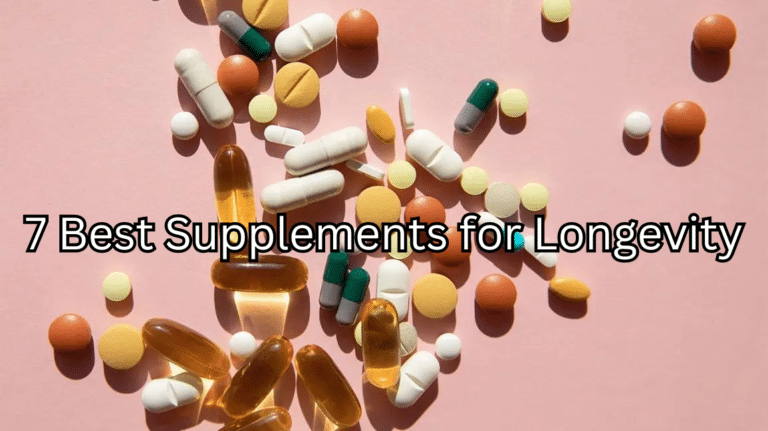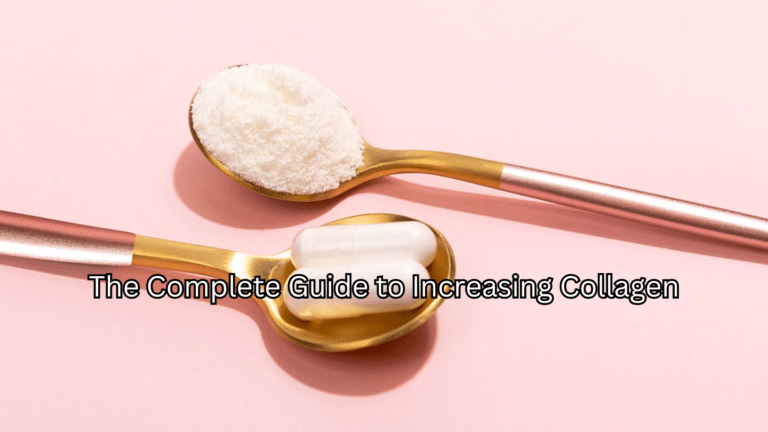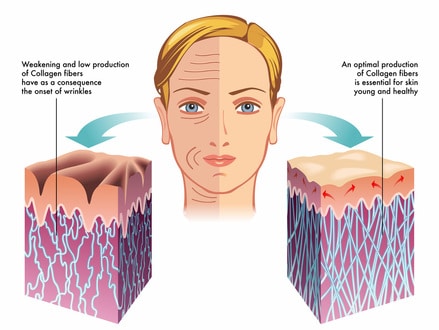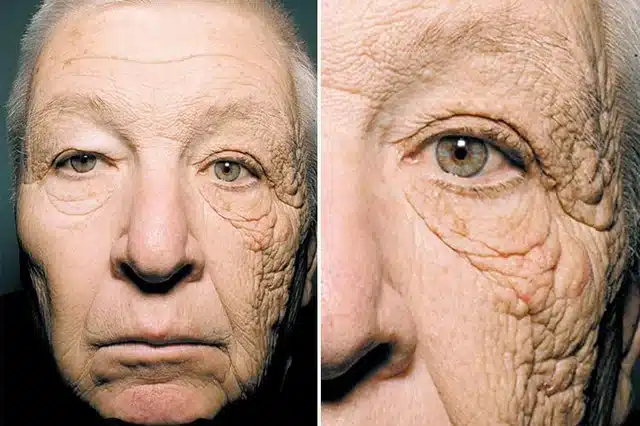As I’ve embarked on my journey to a healthier, longer life, I’ve dived deep into the fascinating world of supplements. This exploration has been truly eye-opening. I’ve discovered that certain nutrients can have a profound impact on our longevity. With so much information out there, it can be overwhelming to figure out what really works and what’s just hype. That’s why I’m excited to share my findings on the 7 best supplements for living a longer and healthier life.
These aren’t just any ordinary vitamins; to me, they’re keys to unlocking a longer, more vibrant life. From antioxidants that combat aging at the cellular level to compounds that enhance brain health, each supplement has played a crucial role in extending my healthspan. I’m here to guide you through what I’ve found to be the most promising paths to longevity, ensuring you have the knowledge to make informed decisions about your wellness journey. Each supplement in this list is heavily backed by scientific literature and I do my best to link to as many studies as possible throughout the article.
The 7 Best Longevity Supplements
Let’s face it, we all want to live as long as we can while maintaining optimal health. But can supplements play a role in increasing lifespan? Based on my research and understanding of the science behind longevity, I’ve pinpointed the seven supplements that stand out for their remarkable benefits. These are NMN, resveratrol, Coenzyme Q10, spermidine, omega-3 fish oil, Vitamin D, and curcumin. Each offers unique advantages in promoting health and extending life span by targeting different aspects of aging and cellular function.
NMN for Mitochondrial Function
Nicotinamide Mononucleotide (NMN) has captured the public’s attention due to the heavy research backing its longevity benefits. It serves as a precursor to Nicotinamide Adenine Dinucleotide (NAD+), a vital molecule that plays a central role in cellular metabolism, energy production, and the maintenance of DNA health.
The significance of NMN stems from its ability to boost NAD+ levels in the body. As we age, NAD+ levels naturally decline, leading to a reduction in cellular vitality and increased susceptibility to age-related decline. By supplementing with NMN, we can potentially restore NAD+ levels, thereby enhancing energy metabolism, supporting cellular repair, and promoting overall cellular health.
Research suggests that increased NAD+ levels can also improve mitochondrial function—the powerhouses of cells—which is crucial for maintaining physical vitality and reducing fatigue. Moreover, NMN has been shown to have potential benefits in protecting against cardiovascular disease, improving insulin sensitivity, and possibly extending lifespan.
Adding NMN to my daily supplement regimen has been part of my strategy to combat the natural decline in cellular health due to aging. Its broad range of benefits supports not just a longer life, but also a healthier and more vigorous one, reinforcing its pivotal role in my approach to aging well. Ever since I started taking NMN, I have noticed a massive increase in energy. It seems like everyone has started taking NMN recently and I and others (including Dr. Andrew Huberman) take Renue by Science Pure Powder NMN (use code ‘brainflow’ at checkout for 10% off your order.
Resveratrol for Cellular Health
Resveratrol shines as a potent supplement for maintaining cellular health. Found in grapes, berries, and peanuts, its ability to mimic the effects of calorie restriction is remarkable. Acting as an antioxidant, resveratrol supports the body in fighting oxidative stress and inflammation, crucial factors in the aging process.
By enhancing the activation of sirtuins, proteins involved in cellular repair and longevity, it contributes significantly to extending one’s life span. A quality resveratrol product can be hard to find, that’s why I along with many others opt for Renue by Science Trans-Resveratrol Powder.
RELATED READING: Harvard Longevity Scientist Reveals His Supplement Stack
Omega-3 Fatty Acids and Heart Health
Omega-3 fatty acids, particularly found in fish oil, play a pivotal role in heart health. My findings highlight their effectiveness in reducing triglycerides, lowering blood pressure, and decreasing the risk of heart disease. These fatty acids improve cardiovascular health by combating inflammation and enhancing endothelial function, making them invaluable in a longevity-focused supplement regimen.
When it comes to fish oil supplementation, picking the right brand is crucial. You might be tempted by those cheap bottles at Costco, but these are typically low-quality, and don’t have a good balance of EPA and DHA. I wouldn’t cut corners when it comes to picking out a fish oil supplement. You should opt for a high-quality, third-party tested brand such as Momentous Omega-3 Fish Oil. It’s backed by the likes of Andrew Huberman, Tim Ferriss, and Dr. Andy Galpin. Use code ‘brainflow’ for 15% off at checkout.
Coenzyme Q10 and Energy Production
Coenzyme Q10 (CoQ10) has become a key component in my exploration of cellular energy production. It’s fascinating to see how crucial CoQ10 is for the health and efficiency of mitochondria—the cellular powerhouses that convert food into usable energy.
Delving into the science behind CoQ10, I’ve learned about its critical role in supporting heart health and its powerful antioxidant properties, which protect cells from oxidative stress and aging. However, CoQ10 levels naturally decline as we age, leading to decreased energy, slower recovery, and increased vulnerability to cell damage.
Recognizing this, I’ve found that supplementing with CoQ10 can significantly help maintain energy and vitality, especially in later years. It replenishes declining levels, supporting an energetic lifestyle and boosting heart health. Integrating CoQ10 into my routine has underscored its immense value in promoting longevity and thriving as we age. Like most supplements on this list, CoQ10 isn’t made by a lot of big supplement brands. That’s why we recommend Renue by Science Liposomal CoQ10 capsules.
RELATED READING: Dr. Andrew Huberman’s Complete Supplement List
Curcumin and Inflammatory Response
Curcumin, the vibrant active compound in turmeric, has become a key focus in my exploration of supplements due to its powerful anti-inflammatory and antioxidant properties. This compound plays a crucial role in modulating inflammatory processes in the body, which is vital because chronic inflammation is linked to many age-related diseases such as arthritis, heart disease, and Alzheimer’s.
By reducing inflammation markers, curcumin not only alleviates symptoms like pain and swelling but also lowers the risk of developing these chronic conditions. Additionally, its antioxidant capabilities help neutralize free radicals, which cause oxidative stress and cellular damage—a major contributor to aging.
Moreover, curcumin may enhance brain function and potentially reduce the risk of brain diseases, which are more common as we age. It is believed to increase levels of brain-derived neurotrophic factor (BDNF), a growth hormone essential for maintaining brain health.
Incorporating curcumin into my supplement stack has helped me address immediate health issues and support my long-term wellness, making it a cornerstone in my pursuit of healthy aging. Its comprehensive benefits underscore its importance in maintaining vitality and preventing age-related deterioration.
Spermidine for Autophagy
I first came across spermidine in Harvard longevity scientist David Sinclair’s New York Times bestselling book, “Lifespan.”. Spermidine has become an integral part of my longevity toolkit due to its role in promoting autophagy, the body’s natural process of cellular cleaning and renewal. This fascinating process is essential for removing damaged cellular components, thus preventing dysfunction and promoting cell health.
The importance of autophagy cannot be overstated—it helps cells operate efficiently and avoid accumulating damage that can lead to cellular aging and related diseases. By increasing the intake of spermidine through supplements, we can actively support this vital cellular process. Enhanced autophagy not only helps in the maintenance of cellular health but also contributes to the overall longevity of our cells.
Furthermore, studies suggest that spermidine may have broader implications for health beyond just autophagy. It has been associated with improved cardiovascular health, potentially reducing the risk of heart disease, and may also play a role in enhancing cognitive function as we age.
I only recently added spermidine to my daily supplement stack. I take Renue by Science’s Liposomal Spermidine first thing in the morning.
RELATED READING: Dr. David Sinclair’s NMN & Resveratrol Protocol
Vitamin D and Immune Function
Vitamin D is paramount for immune function as well as bone health. Its deficiency is widespread, making supplementation necessary for many individuals. Vitamin D’s role in regulating immune responses and reducing the risk of chronic diseases underscores its importance in a longevity-focused supplement strategy, affirming its role in achieving a longer, healthier life.
Moreover, Vitamin D’s influence extends beyond just the immune system and bone health. Research has shown that it plays a significant role in mood regulation and the prevention of mood disorders. Low levels of Vitamin D have been linked to an increased risk of depression, particularly in older adults. By ensuring adequate Vitamin D levels through supplementation, we can support not only our physical health but our mental well-being too, contributing to a holistic approach to longevity and overall life quality. For vitamin D, I take Momentous Vitamin D.
In sum, these seven supplements—NMN, resveratrol, Coenzyme Q10, spermidine, omega-3 fish oil, Vitamin D, and curcumin—offer a broad spectrum of benefits targeting different aspects of aging and health. By incorporating these into one’s daily regime, one can support longevity from multiple angles, enhancing life span and promoting overall well-being.
Understanding Longevity Supplements
The Role of Supplements in Anti-Aging
As I delve deeper into the journey of enhancing lifespan and vitality, it’s clear that supplements play a pivotal role in the anti-aging process. These compounds provide our bodies with the necessary ingredients to combat the signs of aging, both visually and physiologically. By bolstering cellular health, they can significantly deter the aging process at a molecular level. For instance, supplements like NMN (Nicotinamide Mononucleotide) and resveratrol directly target the health and efficiency of our cells, aiming to boost energy levels and enhance DNA repair mechanisms.
Moreover, antioxidants such as Coenzyme Q10 and curcumin play crucial roles in fighting oxidative stress, a leading cause of aging. Oxidative stress damages cells and can lead to chronic inflammation along with a host of age-related diseases. By integrating these supplements into our daily routines, we’re not just aiming for longevity; we’re enhancing our day-to-day quality of life by keeping our cells, the building blocks of our body, in their prime for as long as possible.
How Supplements Can Influence Lifespan
Exploring how these supplements influence lifespan brings to light the diverse ways they support our health. For starters, spermidine, a lesser-known but equally crucial supplement, has been linked to autophagy – the body’s way of cleaning out damaged cells, to make way for new ones. This process is vital for preventing the buildup of cellular waste and maintaining cellular efficiency, thus potentially extending lifespan.
Omega-3 fatty acids, found abundantly in fish oil, contribute to this journey by supporting heart health and reducing inflammation. Long term, this can lead to a lower risk of chronic diseases commonly associated with aging. Similarly, Vitamin D plays an indispensable role in bone health and immune function, both of which are crucial for a long, healthy life.
By choosing supplements like NMN, resveratrol, Coenzyme Q10, spermidine, omega fish oil, vitamin D, and curcumin, I’m not just focused on adding years to my life; I’m also adding life to my years. Each supplement offers unique benefits that, when combined, can comprehensively support longevity and overall well-being. This holistic approach ensures I’m covering various aspects of health, from cellular regeneration to systemic protection, setting a solid foundation for a longer, healthier life.
Evaluating Longevity Supplements
Selecting the best longevity supplements involves careful consideration of various factors. My approach emphasizes scientific backing, safety, effectiveness, and the ability to target key aging mechanisms. Below, I dive into the criteria for choosing top supplements and the science that makes them indispensable for those seeking to enhance their lifespan and health span.
Criteria for Selecting the Best Supplements
When I select longevity supplements, my primary focus is on:
- Scientific Evidence: I prioritize supplements with robust scientific studies backing their benefits. For instance, research demonstrating that a supplement can significantly impact cellular health or specific aging processes is a strong indication of its potential as a longevity supplement.
- Safety Profile: Supplements must have a proven track record of safety. I look for options with minimal side effects and a low risk of interactions with other supplements or medications.
- Mechanism of Action: Understanding how a supplement works is crucial. I opt for supplements that address aging at the cellular or molecular level, such as promoting DNA repair, reducing oxidative stress, or enhancing mitochondrial function.
- Bioavailability: The supplement’s form and formulation must ensure that the body can effectively absorb and use it. For example, some forms of curcumin are more bioavailable than others, making them more effective at lower doses. That’s why I’m only recommending Renue by Science and Momentous.
How to Integrate Longevity Supplements Into Your Diet
Integrating longevity supplements, such as NMN, resveratrol, Coenzyme Q10, spermidine, omega fish oil, vitamin D, and curcumin, into your diet requires thoughtful consideration. By paying attention to dosage, timing, and potential interactions, you can optimize the benefits these supplements offer.
Dosage and Timing Considerations
Determining the correct dosage and timing can significantly enhance the efficacy of longevity supplements. It’s essential to follow manufacturers’ guidelines or a healthcare provider’s advice for precise dosages, as these can vary widely among supplements.
- NMN: Starting with 250-500 mg per day in the morning can support cellular health and energy levels.
- Resveratrol: 150-500 mg daily, preferably with a meal containing fat for enhanced absorption.
- Coenzyme Q10: 100-200 mg per day, with a meal to improve bioavailability. Taking it in the morning can prevent potential sleep disturbances.
- Spermidine: Dosage recommendations can vary, so it’s best to follow product-specific guidelines. Taking spermidine in the evening may mimic its natural production cycle.
- Omega Fish Oil: 250-500 mg of EPA and DHA daily. Consuming fish oil with a meal can reduce the risk of gastrointestinal discomfort.
- Vitamin D: 800-2000 IU daily, based on individual needs and exposure to sunlight. Taking Vitamin D with a fat-containing meal can increase absorption.
- Curcumin: 500-1000 mg per day, paired with black pepper extract to enhance absorption.
Spacing out supplements throughout the day, according to individual needs and supplement type, can optimize absorption and efficacy while minimizing potential side effects.
Interactions With Medications and Other Supplements
Prior to introducing any new supplement into your regimen, considering potential interactions with existing medications and supplements is critical.
- Blood-Thinning Medications: Omega fish oil and vitamin D could potentially interact with blood thinners, increasing bleeding risk.
- Anticoagulants and Antiplatelet Drugs: Curcumin and resveratrol might enhance the effects of these drugs, leading to an increased bleeding risk.
- Blood Pressure Medications: Coenzyme Q10 could lower blood pressure, potentially interfering with the effects of blood pressure medications.
- Antidiabetic Drugs: Since both curcumin and resveratrol can lower blood sugar levels, they might amplify the effect of diabetes medications, requiring close blood sugar monitoring.
Consulting with a healthcare professional to discuss potential interactions is advisable, ensuring a safe and effective approach to integrating these supplements into your diet. This step not only helps in tailoring a regimen that suits your individual health profile but also in maximizing the longevity benefits of the supplements.
The Importance of a Holistic Approach to Longevity
Optimizing one’s lifespan and health quality isn’t solely reliant on supplements, even though products like NMN, resveratrol, Coenzyme Q10, spermidine, omega fish oil, vitamin D, and curcumin hold significant merit in supporting longevity. A holistic approach encompasses integrating these supplements with crucial lifestyle adjustments that amplify their benefits. In my experience, addressing both supplement intake and lifestyle factors synergistically offers the best path to longevity.
Lifestyle Factors That Complement Longevity Supplements
To complement the longevity benefits of supplements like NMN and resveratrol, I’ve identified lifestyle habits that are just as essential. First, maintaining a balanced diet rich in fruits, vegetables, whole grains, and lean proteins can provide a strong foundation. This dietary approach ensures that the body gets a wide range of nutrients beyond those obtained from supplements.
Second, hydration stands out as a pivotal but often overlooked element. Drinking sufficient water facilitates the elimination of toxins and supports cellular health, creating an environment where supplements can work more effectively.
Moreover, adequate sleep cannot be overemphasized. Quality sleep patterns enhance recovery, reduce stress levels, and improve overall health metrics, which in turn, bolster the effectiveness of longevity supplements.
Regular Exercise and Stress Management
Regular exercise plays a critical role in amplifying the effects of longevity supplements. Activities such as cardiovascular training, strength exercises, and flexibility routines enhance heart health, muscle tone, and joint mobility. These benefits are complemented by supplements like Coenzyme Q10 and omega fish oil, which support heart health and reduce inflammation.
Beyond physical health, managing stress through mindfulness, meditation, or yoga is crucial. High-stress levels can negate the benefits of both lifestyle adjustments and supplements. Techniques that lower stress not only enhance mental well-being but also improve physiological responses, making the body more receptive to the anti-aging effects of supplements like spermidine and curcumin.
Adopting these lifestyle modifications alongside a regimen of scientifically backed supplements ensures a comprehensive approach to longevity. This holistic method not only maximizes the potential benefits of each supplement but also fosters a healthier, more vibrant life overall.
Final Thoughts
Exploring the world of longevity supplements like NMN, resveratrol, and Omega-3 fatty acids offers a promising avenue to enhance our health and well-being. It’s clear that these supplements, when chosen with care and incorporated into a balanced lifestyle, can provide significant benefits. However, it’s crucial to remember that supplements alone aren’t a magic bullet.
They work best when used in conjunction with a healthy lifestyle that includes nutritious food, regular physical activity, and adequate rest. Always consult with a healthcare professional before adding any new supplements to your regimen to ensure they’re right for you. By doing so, you’re taking a comprehensive approach to longevity, paving the way for a healthier, more vibrant life.








